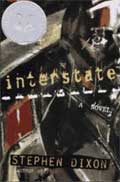 This book review was originally published on Critics’ Choice on August 3, 1995.
This book review was originally published on Critics’ Choice on August 3, 1995.
Over the course of sixteen works of fiction, Baltimore author Stephen Dixon has constructed a vision of contemporary life that’s at once morbid and hysterical and frighteningly true. Dixon’s quirky run-on sentence writing style has earned him the adoration of countless numbers of his former students at Johns Hopkins University (this reviewer among them), colleagues in academia, and book critics.
Yet although Dixon has received his share of accolades from the high-brow literary world — his last novel, the colossal Frog, received nominations for both the National Book Award and the PEN/Faulkner Award — his work has only recently started to achieve the sort of mainstream interest that it so much deserves. Last year’s compilation The Stories of Stephen Dixon is readily available from any mall book chain; earlier classics of urban angst like Movies, Too Late, and Love and Will, unfortunately, languish in obscurity or are out of print.
Here’s hoping that the publication of Interstate, his latest novel, will bring a new appreciation for this modern master of the art of fiction. One of Dixon’s most cohesive treatises on the horrors that float just beneath the surface of American life, Interstate charters you a ride on the stream of consciousness of a man experiencing the ultimate fear: the death of a child.
Nathan Frey is a devoted father and husband who must suddenly deal with the fact that his little girl Julie has been shot by a passing maniac on the interstate. Everyone thinks they have the composure to deal with a crisis situation; Nathan learns the truth about himself as he quickly falls to pieces under the pressure. How do you keep your daughter alive on a nearly deserted highway when she’s bleeding to death from a bullet wound in the chest? How do you call your wife at her parents’ house to tell her the news? And how do you deal with the knowledge that had you done something differently that day — stopped at that last rest stop for a few minutes, driven a little faster or slower — you might have avoided your daughter’s senseless murder altogether?
Aside from the core fact of the tragedy, all other details in the book are fragmented. Dixon presents us with eight different scenarios of the events leading up to and following that one inciting incident, many of which directly contradict one another. The best chapter shows Nathan doggedly hunting down and taking revenge on the two men responsible for Julie’s death; in this scenario, Nathan ends up a long-term prison convict, alienated from the remainder of his family. Another has him praying desperately alongside the corpse, promising that he’ll devote his life to God if only he can have his daughter back. A later chapter has him avoid the gunmen entirely only to meet with a similar fate under different circumstances further along the deadly interstate.
Like every Dixon hero, we see Nathan Frey warts and all: here quibbling with and upsetting his daughters earlier in the day at FAO Schwarz, there drifting into idle sexual fantasy at the most inappropriate times. Nathan Frey is a collection of nervousness, anxiety, and uncertainty — in short, he’s a human being trying to cope with universal human problems, sometimes with success and sometimes with humiliating failure.
Interstate takes no shortcuts and uses no euphemisms in confronting the dark side of our jarring, claustrophobic, and increasingly violent society. It’s a blunt and revelatory look at the anxieties that creep around in our subconscious night after night, and not soon to be forgotten.